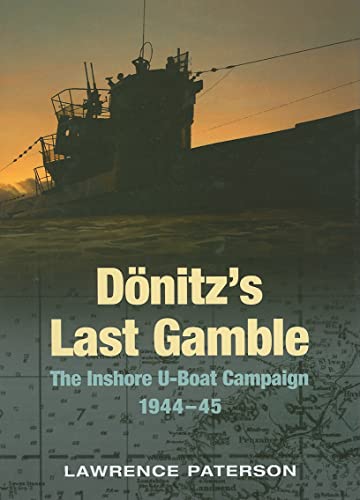Verwandte Artikel zu Donitz's Last Gamble: the Inshore U-boat Campaign...

Inhaltsangabe
After the June 1944 D-Day landings D'nitz withdrew his U-boat wolf-packs from the Atlantic convoy war and sent them into coastal waters, where they could harass the massive shipping movements necessary to supply the Allied armies advancing across Europe. Caught unawares by this change of strategy, the Allied anti-submarine forces were ill-prepared for the novel challenges of inshore warfare. It proved surprisingly difficult to locate U-boats that could lie silently on the seabed, and the shallow waters meant less than ideal conditions for sonar propagation. Furthermore, because the battle was nearer home, the U-boats wasted less time on transit, so at any one time there were more of them in combat. In the final months of the war there was also the threat of far more advanced and potent submarine types entering German service, but thanks largely to overwhelming numbers of escorts this last gamble by D'nitz was defeated. In fact, the Allied navies had never really established superiority, and this was to have enormous significance later during the Cold War, when the same tactics were planned by the Soviets. Since it had such a major impact on post-war naval thinking, it is a story of the utmost importance told by an accomplished U-boat author.
Die Inhaltsangabe kann sich auf eine andere Ausgabe dieses Titels beziehen.
Críticas
"...recommend highly to anyone interested in submarine warfare of WW2, and for anyone interested in understanding how that effected naval warfare into the 21st Century. ...very high quality history."--IPMS/USA
Reseña del editor
After the June 1944 D-Day landings D'nitz withdrew his U-boat wolf-packs from the Atlantic convoy war and sent them into coastal waters, where they could harass the massive shipping movements necessary to supply the Allied armies advancing across Europe. Caught unawares by this change of strategy, the Allied anti-submarine forces were ill-prepared for the novel challenges of inshore warfare. It proved surprisingly difficult to locate U-boats that could lie silently on the seabed, and the shallow waters meant less than ideal conditions for sonar propagation. Furthermore, because the battle was nearer home, the U-boats wasted less time on transit, so at any one time there were more of them in combat. In the final months of the war there was also the threat of far more advanced and potent submarine types entering German service, but thanks largely to overwhelming numbers of escorts this last gamble by D'nitz was defeated. In fact, the Allied navies had never really established superiority, and this was to have enormous significance later during the Cold War, when the same tactics were planned by the Soviets. Since it had such a major impact on post-war naval thinking, it is a story of the utmost importance told by an accomplished U-boat author.
„Über diesen Titel“ kann sich auf eine andere Ausgabe dieses Titels beziehen.
EUR 6,45 für den Versand von Vereinigtes Königreich nach USA
Versandziele, Kosten & DauerSuchergebnisse für Donitz's Last Gamble: the Inshore U-boat Campaign...
Donitz's Last Gamble: The Inshore U-Boat Campaign 1944-45
Anbieter: WorldofBooks, Goring-By-Sea, WS, Vereinigtes Königreich
Hardback. Zustand: Very Good. The book has been read, but is in excellent condition. Pages are intact and not marred by notes or highlighting. The spine remains undamaged. Artikel-Nr. GOR002225021
Anzahl: 1 verfügbar
Donitz's Last Gamble - the Inshore U-Boat Campaign 1944-45
Anbieter: Wadard Books PBFA, Farningham, KENT, Vereinigtes Königreich
Cloth. Zustand: Very Good. Zustand des Schutzumschlags: Very Good. Following the D-Day landings in June 1944, Donitz sent his U-Boats into coastal waters, where they could harass the crucial Allied supply lines to the new European bridgehead. 208pp well illustrated in black and white. Inscription to front end paper. Artikel-Nr. 18186s36
Anzahl: 1 verfügbar
Donitzs Last Gamble The Inshore UBoat Campaign 194445
Anbieter: Buchpark, Maidenhead, Berkshire, Vereinigtes Königreich
Zustand: Very Good. Condition: Very Good, Pages: 208, Size: 24.5x17.7x1.5. Artikel-Nr. 4078067/23
Anzahl: 1 verfügbar
